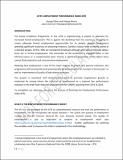| dc.contributor.author | Kaonga, Oliver | |
| dc.contributor.author | Chibuye, Miniva | |
| dc.date.accessioned | 2021-01-18T14:55:38Z | |
| dc.date.available | 2021-01-18T14:55:38Z | |
| dc.date.issued | 2009 | |
| dc.identifier.citation | JCTR (2006). JCTR’S EMPLOYMENT PERFORMANCE INDEX (EPI). Lusaka. Zambia; Jesuit Centre for Theological Reflection (JCTR). | en |
| dc.identifier.uri | https://repository.jctr.org.zm/handle/20.500.14274/229 | |
| dc.description | The EPI is a tool developed by the JCTR to comprehensively measure and track the performance of employment. The EPI incorporates two broad indicators – the quality and quantity of employment created. As the ILO Director General Mr. Juan Somavia stated the quality of employment is just as important as creation of employment itself. This index can be used to measure and rank the performance in any company/ institution against certain expected targets of employment. Improvements in the companies’ performance will be reflected in the changes of the EPI scores from one period to another. The EPI will be produced on an annual basis and will help track the results from Government’s efforts in creating an enabling environment for investments, which ultimately is expected to create employment. The paper continues to give a rationale for the use EPI giving further methods of calculating the EPI. | en |
| dc.description.abstract | The Social Conditions Programme of the JCTR is implementing a project to advocate for increased formal employment. This is against the backdrop that the country is struggling to create adequate formal employment opportunities for its people, despite Government spending significant resources on attracting investors. Zambia’s labour force currently stands at 5,410,610 people. Of this, 90% are considered employed although only 10% of the total labour force are in formal employment. The remainder of the workforce is engaged either in the informal sector or in unpaid family work. Clearly, a significant proportion of the labour force cannot find productive and remunerative employment. Realising that employment is one of the major engines of growth and poverty reduction, the programme will consistently and systematically be advocating for an increase in formal jobs as well as improvement of quality of jobs where necessary. This project is consistent with Government’s plans to promote employment growth as evidenced by among others the inclusion of employment as a national key performance indicator in the draft Sixth National Development Plan (SNDP) spanning from 2011 to 2015. To strengthen our advocacy, we are in the process of finalising the Employment Performance Index (EPI). | en |
| dc.language.iso | en | en |
| dc.publisher | Jesuit Centre for Theological Reflection | en |
| dc.rights | Attribution-NonCommercial-ShareAlike 3.0 United States | * |
| dc.rights.uri | http://creativecommons.org/licenses/by-nc-sa/3.0/us/ | * |
| dc.subject | Employment performance | en |
| dc.subject | Employment | en |
| dc.subject | EPI | en |
| dc.title | JCTR’s Employment Performance Index (EPI) | en |
| dc.type | Research Paper | en |

